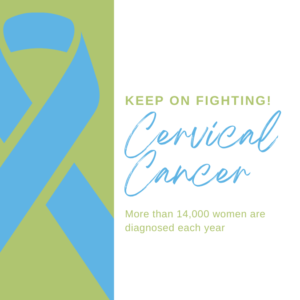Cervical Cancer Awareness Month

As you are considering scheduling your healthcare appointments for the year, now is a good time for women and girls to follow up on routine care or to establish new care with a gynecologist.
A gynecologist is a medical provider who specializes in female reproductive health. Anyone who has female organs can benefit from regular visits. Routine screening for sexually transmitted infections, screening for cancer, and medical care for conditions that impact the reproductive systems such as endometriosis, ovarian-cysts, pelvic-pain, and menstrual, hormonal, and fertility issues are some of the services that are provided.
One of the reasons why as a mental health professional I am writing about cervical cancer awareness is that there are so many things that are not addressed until it is too late. Conversations and preventative care can help identify and treat concerns before there are more significant long-term consequences.
If sex was an uncomfortable topic in your family or culture, then perhaps you did not talk about sex or awkwardly gave a response when needed. It is OK to acknowledge your own discomfort as a parent when talking to your child about sexual health. A warm, supportive relationship with your child will help create opportunities for ongoing conversations. There are also professional and online resources that can be helpful in offering guidelines. The American Sexual Health Organization (ASHA) is a great place to start.
Also, please do not hesitate to ask your questions about sexual health with your healthcare provider. The American College of Obstetricians and Gynecologists (ACOG) recommends that girls see a gynecologist for their first exam between ages 13-15.
Many young people who are sexually active are reluctant to be open and honest to talk to a doctor about their sexual activity, yet approximately half of the sexually transmitted infections with STDs are in young people ages 15-24.
HPV is a very common sexually transmitted infection that is transmitted through sexual contact. Many people who have human-papillomavirus may not show symptoms, and in many cases, HPV goes away on its own. However, when HPV does not go away, genital warts and cancer are some of the consequences on health. Almost all [99%] cases of cervical cancer are linked to infection with the human papillomavirus(HPV). Getting a vaccine is one way to help protect yourself against cancer caused by HPV infection in addition to pap tests. The human papillomavirus (HPV) vaccine is recommended in two doses for girls between the ages of 9 to 14, which is also around the recommended age of establishing care with a gynecologist.
What if I am not sexually active? Is there any reason to see a gynecologist? Yes! Getting your first pap test for cervical cancer screening is still a good idea. HPV tests look for the detection of viruses in the cervix; whereas Pap tests (aka pap smear) look for precancer cells in the cervix. Cervical cancer screening guidelines from the American Cancer Society recommend screening starting at age 25 with an HPV test and having HPV testing every five years through age 65.
Good sexual health is an important aspect of overall well-being, including mental health. That is one reason why your therapist at CARE Counseling will ask you about your sexual health.
Sexual health concerns such as painful periods or pain during intercourse, pregnancy loss, struggles with infertility, and hormonal changes are important topics to mental health. If you are struggling with coping with a medical condition that is impacting your sexual health, counseling is a great place to get support and have a space to process your thoughts and feelings.
If you are uncomfortable talking about sex and would like to have a safe place to process, a therapist can help support you in this area. If the thought of going to the doctor’s office for routine care such as a pap smear sends signals of panic, let’s talk about it. A therapist can help explore what your body is experiencing and identify strategies to cope.
Sex, relationship, and intimacy are important aspects of being human. We want you to feel empowered to make decisions for your and your sexual health
Written By: Charlotte Johnson, MA, LPCC
We’re Here to help
Our wellness experts will be happy to take care of you. You can CLICK HERE to schedule an appointment now or call (612)223-8898.
Meet Clinicians
We’re united by our commitment to providing effective, relevant, and innovative mental health support at all stages of your journey. Click Here to find out more about who we are, where we come from, and how we live out CARE’s mission every day.
The professionals at CARE are actively collecting and creating resources to help with what you need. We’re Here for You.
source https://care-clinics.com/cervical-cancer-awareness-month/
No comments:
Post a Comment